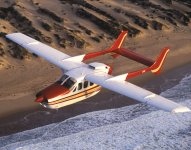Old Red, just take your time before launching into buying a GA airplane. There are lots of "cheap" 2 seater used airplanes out there on the market (there are groups on Facebook and the old standby Barnstormers
BARNSTORMERS.COM Find Aircraft & Aircraft Parts - Airplane Sale, Jets, Helicopters, Experimental, Warbirds & Homebuilt
Just remember than many of these are really getting on in age. Many from the 50's and 60's. If you buy a GA airplane and it turns out to need work to pass annual, the FBO usually has you over a barrel. The parts are often very expensive or may need to be hand made (aluminum structural parts) and the labor rate is not your friend either.
Once you pass 2 seaters and looking at 4-6 seaters, everything said above gets kicked up a notch. The engine needs to make a lot more HP to carry all that weight and that puts the price of a new engine north of $25k and rebuilds less of course but still very spendy.
The guy who hired me into my current job was a pilot and at the time owned a Cessna Cardinal (High wing, retract gear, turbocharged) and made regular flights from MI to Florida where his mother and other relatives lived. He ended up crashing the Cardinal due to what was believed to be the rudder freezing up from icing conditions. It happened on landing where the rudder is essential to get the airplane lined up straight with the runway. The plane was insured and he was not badly hurt and fortunately was the only person aboard. He then replaced the Cardinal with a Bonanza, the later model with the conventional tail(about $140k invested). Fast airplane, 170kt cruise was easy (195mph). He could fly from southern MI to Naples FLA in a day easy. He was fit and trim, did a lot of running. Had no known health problems. He was 62. Went for a "routine" flight medical and the FAA doc told him he had a heart problem and he was grounded. He then went to the local cardiologist for a checkup and second opinion and was given a clean bill of health. He then got with the medical team at AOPA and they fought the FAA over the diagnosis. He had to wear a monitor 24/7 for heart rate and blood pressure and it logged all the data and spent a bunch of money on lawyers. They won the case against the FAA after many months and he got his medical reinstated.
A few months later, while driving to church on a Sunday morning, he slumped over the steering wheel of the car at a red light. His wife was sitting in the passenger seat. He never regained consciousness. So sometimes those bad FAA doctors are actually right and the civilian medical establishment just sees you as their meal ticket..... Just thought I would throw that out there since everyone hates on the docs that work for the FAA.
Go ahead and get your PPL. There are very few schools offering the sport pilot training in actual sport pilot airplanes, all of which was supposed to save money (unless you live in FLA in which case you might seriously consider that route). Getting your ticket is just a license to learn. An entry exam which suggests you are not going to kill yourself right away. Then seriously consider getting a newer ultralight (part 103) airplane to stay current in and just have a little fun. You can get something very nice for $12k. They are cheap to own, cheap to fly and free from regulation. You can do all the maintenance yourself unless you dont feel competent to do the work. If you are still liking it after a couple of years, start looking at some of the light sport options for 2 people and investigate flying clubs in your area where you might be able to rent a 4 seat airplane for WAY less money than you ever can with owning.
It is possible to get into a late model LSA for under $80k and possibly for under $50k (composite airframe, less than 15 years old, 80-100hp engine, much less fuel etc). A LSA can likely do 90% of what you want and then you fly the club airplane for the balance of what you need, since you have your PPL. Give it some time before buying, there are an awful lot of airplanes sitting in rented hangers that see very little flight time every year.


